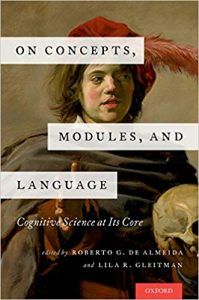David Lobina in Inference Review:
 The cognitive revolution that gripped linguistics, psychology, and philosophy in the 1950s and 1960s owes much to Noam Chomsky and the intellectual milieu then forming around him at MIT. Chomsky’s prominence is well earned. Jerry Fodor’s contributions may prove as enduring. In On Concepts, Modules, and Language, Roberto de Almeida and Lila Gleitman have brought together some of Fodor’s former colleagues and collaborators, including Chomsky, to discuss his work. Each contributor was asked to engage critically with one of two big topics close to Fodor’s heart: the architecture of the human mind, and the language of thought.
The cognitive revolution that gripped linguistics, psychology, and philosophy in the 1950s and 1960s owes much to Noam Chomsky and the intellectual milieu then forming around him at MIT. Chomsky’s prominence is well earned. Jerry Fodor’s contributions may prove as enduring. In On Concepts, Modules, and Language, Roberto de Almeida and Lila Gleitman have brought together some of Fodor’s former colleagues and collaborators, including Chomsky, to discuss his work. Each contributor was asked to engage critically with one of two big topics close to Fodor’s heart: the architecture of the human mind, and the language of thought.
Fodor is well known among psychologists for his thesis that there is a tripartite division to the human mind, a position he first defended in The Modularity of Mind.1 First, there are the sense organs that convert light and sound into signals to the nervous system. The study of these organs is best left to the psychophysicist. Then there are modules that further analyze the input. This is, Fodor argues, the domain of psychology. Visual perception and language comprehension are more-or-less modular: they are independent of our overall knowledge. Fodor’s stance went against the dominant view.
What Fodor had in mind can be explained in intuitive terms.
More here.
